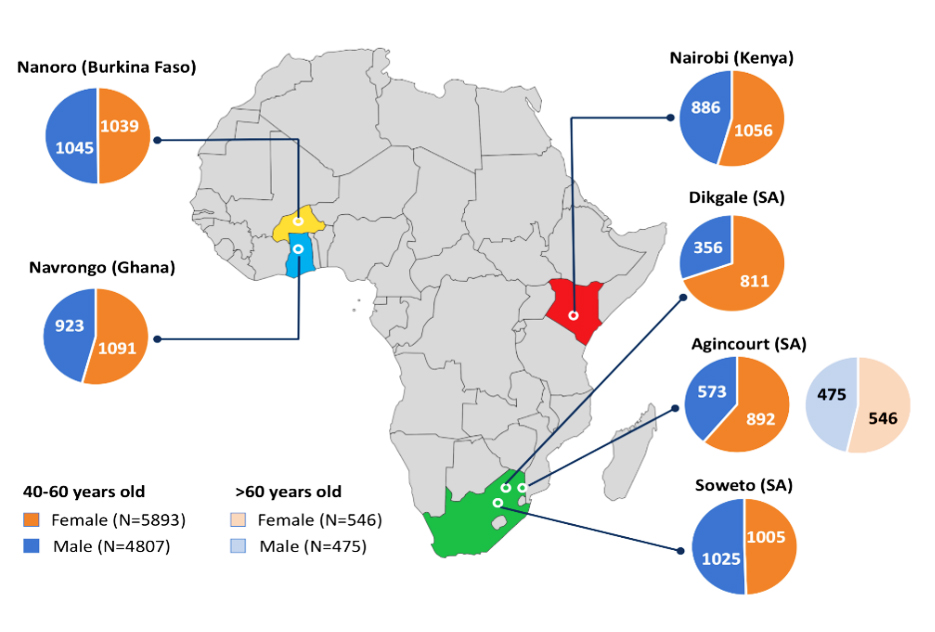- The Africa Wits-INDEPTH partnership for Genomic Studies is the flagship project for the SBIMB. The study is a partnership between Wits University and the International Network for the Demographic Evaluation of Populations and their Health in low and middle income countries (INDEPTH). This NIH-funded Human Heredity and Health in Africa (H3Africa) study aims to examine genomic and environmental factors that influence body composition, body fat distribution and cardiometabolic disease risk in middle aged African populations. For more information visit https://h3africa.org/.
The project was investigated between 2012 and 2023. Sub-projects and project emanating from this study are:
Longitudinal study: HAALSI
SBIMB role: DNA extractions
Genetics and Population Structure: Risk Score Methods and Analysis for Populations of Diverse Ancestry (PRIMED)
CARDINAL project funded by the NIH (2021-2026) is a collaboration with the University of Maryland. This project brings together several cohorts of African ancestry to build a large cohort of over 50,000 participants with relevant phenotype and genomic data, referred to as the CARdiometabolic Disorders IN African-ancestry PopuLations (CARDINAL). The AWI-Gen study will contribute data of over 10,500 participants. Prof Michele Ramsay is the co-PI for this project.
Understanding the relationship between the gut microbiome, and cardiometabolic disease and aging in African populations:
Research is focused on profiling the gut microbiome of individuals in Soweto, Johannesburg, and in Agincourt (Mpumalanga). The study aimed to characterise the microbiome composition and community structure in these cohorts; and to explore the association between cardiometabolic disease risk factors and metagenomic profiles.
Aging, body fat distribution and cardiometabolic disease risk factors in menopausal African women:
The aim of this study is to examine how menopause contributes to weight change, diabetes and CMD risk in midlife women in the AWI-Gen cohort.
VariantBio
The SBIMB is collaborating with Variant Bio (A venture capital company based in the USA) to develop and eQTL dataset for blood in black South Africans. This project leverages knowledge generated by AWI-Gen, through the analysis of genomic data to identify individuals according to specific criteria for inclusion. The project aims to understand the effects of genetic variation on gene regulation in South Africa individuals in three South African AWI-Gen study sites. Sample analyses and data generation are complete and currently scientists are working on data QC and analyses.
AWI-Gen-XHALE: Establishing a network to explore respiratory disease in the context of multi-morbidity in four African countries:
This research aimed to build a network of expertise to measure respiratory health in the participants of an established African multicohort, AWI-Gen, that focused on cardiometabolic diseases. This network focused on respiratory health within the context of multimorbidity and include collaborators from countries within Africa and abroad to develop a platform to study respiratory disease in different African contexts, with a particular focus on how this co-occurs with cardiometabolic disease. This project developed capacity by including training on methods to measure, interpret and research respiratory health at the six different African study sites in Kenya, Burkina Faso, Ghana, and South Africa. Currently data from this study is being mined to produce publications on African genomic data which is underrepresented.
LEAP-EPI
Air pollution is a leading cause of premature mortality, and acute and chronic health effects globally. Sub-Saharan Africa faces a growing burden of air pollution driven by human activities and climate change, but whether outcomes from studies in Europe and North America can be extrapolated to African populations is poorly understood. Sufficiently granular environmental data on air pollution exposure is lacking from longitudinal cohorts in sub-Saharan Africa. The AWI-Gen-XHALE Academy of Medical Sciences GCRF research network identified air pollution data linkage as a key need and opportunity. While many exposure studies have been conducted in Africa, the AWI-Gen consortium offers unprecedented longitudinal health, phenotype, and exposure (indoor cooking and smoking) records, plus genetic data, which can be related to air pollution exposures.
This project aims to; (1) perform a comprehensive assessment of available global and local air pollution data across two (urban and rural) AWI-Gen XHALE study sites; (2) Develop a sustainable sampling methodology for indoor and outdoor air quality data at different levels of exposure in low- and middle-income contexts; (3) to build local capacity for air quality research-involve local communities in developing sensor deployment and exposure mitigation strategies; and contribute evidence for national policies.

Figure 1: AWI-Gen research project sites.




